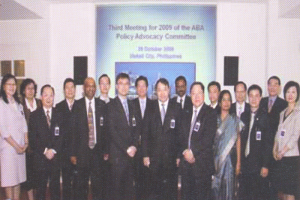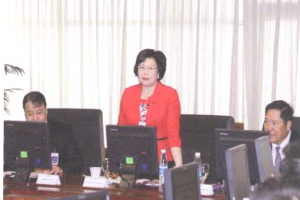Promoting Innovative Policies to Encourage Expanded Microfinance Operations of Commercial Banks in the Asia-Pacific Region
1. Recognizing the growing importance of financial inclusion given the current economic environment and its impact on developing economies, the Asian Bankers’ Association reiterates its recommendations in its previous position paper Improving the legal, policy and regulatory environment for financial inclusion through microfinance in emerging markets dated August 19, 2008. We believe that increasing access to financial services at the bottom of the economic pyramid is important to alleviating the deleterious effects of the present global economic downturn on vulnerable sectors of society, as well as to creating a broader and more sustainable base for future economic growth.
2. The ABA sees the need for governments in the region to adopt innovative strategies to further promote financial inclusion. We note that such strategies have produced very positive results in some developing economies, and that there is much potential for sharing of experiences to disseminate such best practices more widely. We commend efforts by international and regional organizations and multilateral agencies to promote such cooperation among developing economies, such as the recently-held workshop “Promoting Financial Inclusion through Innovative Policies.”[1]
 3. We endorse further efforts to accelerate progress in the six key policy areas that were the focus of discussions at the above-mentioned workshop: agent banking, mobile phone banking, increasing the diversity of microfinance service providers, reform of state-owned banks, financial identity and consumer protection. In particular, we note the following conclusions of the workshop regarding these policy areas:
3. We endorse further efforts to accelerate progress in the six key policy areas that were the focus of discussions at the above-mentioned workshop: agent banking, mobile phone banking, increasing the diversity of microfinance service providers, reform of state-owned banks, financial identity and consumer protection. In particular, we note the following conclusions of the workshop regarding these policy areas:
- The further development of agent banking requires a balanced and realistic legal and regulatory framework that helps build strong principal-agent relationships, allows innovation and the use of new technologies, permits data to be transmitted in a safe and cost-effective manner and provides appropriate transparency, accountability and customer protection. Frameworks to promote sound reputational risk management strategies are also needed given the impact of the current situation on trust and confidence levels in the banking industry.
- Mobile phone banking requires a seamless regulatory framework that allows convergence of financial services, IT and telecommunications, while maintaining financial system integrity and consumer protection. Experiences highlight the need for regulation to follow the market and avoid overregulation of low-value payments that are not likely to be used for money laundering.
- The emergence of new models and new service providers has expanded the usefulness and scope of microfinance to such activities as short-term loans, money transfers and micro-insurance. Various experiences underscore the need for a coherent legal and policy framework for regulating microfinance as a line of business. An effective framework focuses on products rather than institutions, is based on stakeholder consultation and collaboration, takes into account the costs of prudential regulation, has enough flexibility to allow innovation, and is complemented by improved technical capacity of supervisors and strong governance and internal controls in microfinance institutions.
- Enabling state-owned banks to play a positive role in financial inclusion requires strong political commitment by the government and independent management, supported by improvements in financial literacy, international support and adequate funding.
- Lack of financial identity is a major obstacle for many people to effectively access financial services. Creating financial identities involves dealing effectively with know-your-customer procedures, such as through the use of simplified requirements at the lowest levels that increase as a client passes over a series of thresholds, the use of innovations such as biometrics, data protection, including design of optimal privacy protocols and improved consumer education on privacy issues, and creating incentives for people to obtain financial identities.
- Promoting consumer protection at the bottom of the economic pyramid involves promoting financial literacy, transparent provision of financial services, fairness of contracts, fair and transparent compensation of customers when there are failures of agents, outsourced services or IT systems, fair recovery practices, and a system for redress of client concerns.
4. The ABA believes that the commercial banking sector can contribute much to increasing financial inclusion in the Asia-Pacific region, if supported by enabling policies. We especially recommend the following to encourage more commercial banks to provide services that increase financial inclusion levels:
- Authorities should develop policy frameworks to promote access to microfinance services of migrant workers throughout the region. This market presents opportunities for banks, with migrant worker remittances estimated to grow to US$500 billion by 2010. Currently, however, most banks in the regions are still hesitant to develop the market for migrant worker remittances given the value of small transactions. To encourage banks to initiate more convenient technology-based products and services (including through agent and mobile phone banking) to offer savings, credit, money transfer and insurance services to migrant workers in host countries, regulators should make appropriate adjustments of the application of anti-money laundering and Basel II-related requirements to such transactions.
- Governments should review taxation frameworks to encourage commercial banks to expand microfinance services in rural areas and marginalized communities.
 5. The ABA encourages focused regional policy dialogue and capacity-building efforts to accelerate the development and dissemination of best practices in promoting financial inclusion among developing economies in the region, as well as to promote sustainable implementation of financial inclusion strategies through regional monitoring of efforts, impact assessments, peer review and similar activities. In this context, we urge the Asia-Pacific Economic Cooperation (APEC) Finance Ministers to collaborate with the private sector and the region’s financial industry to launch an APEC Financial Inclusion Initiative. As the leading voice of the Asian financial industry, the ABA stands ready to support and participate in these efforts, in cooperation with other international organizations and agencies.
5. The ABA encourages focused regional policy dialogue and capacity-building efforts to accelerate the development and dissemination of best practices in promoting financial inclusion among developing economies in the region, as well as to promote sustainable implementation of financial inclusion strategies through regional monitoring of efforts, impact assessments, peer review and similar activities. In this context, we urge the Asia-Pacific Economic Cooperation (APEC) Finance Ministers to collaborate with the private sector and the region’s financial industry to launch an APEC Financial Inclusion Initiative. As the leading voice of the Asian financial industry, the ABA stands ready to support and participate in these efforts, in cooperation with other international organizations and agencies.
28 July 2009, Bangkok
[1] This workshop was jointly organized by the APEC Business Advisory Council, the Advisory Group on APEC Financial System Capacity-Building, the Asian Development Bank Institute and the Alliance for Financial Inclusion, in collaboration with the Foundation for Development Cooperation, the Inter-American Development Bank and the International Finance Corporation in Tokyo from March 31 to April 3, 2009.

